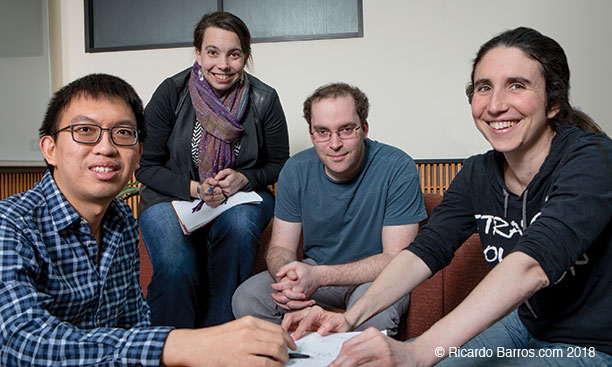In-Betweeners: For Postdocs, Vital Work in Positions Marked by Uncertainty
In an online comic strip satirizing campus life, the young scholars colloquially known as postdocs are portrayed as invisible ghosts, or as tiny cogs in the academic machine. Beneath a banner declaring “National Postdoc Appreciation Week,” a smaller banner reads, “Next week: Back to being underappreciated!”
“A postdoc is the most disenfranchised member of the community,” says Alessandro Giammei, an Italian studies postdoc who raves about his experience in Princeton’s prestigious Society of Fellows in the Liberal Arts, but who has friends with unhappier stories. “Who really advocates for them? Not many people.”
As postdocs’ numbers continue to grow, both nationally and locally, Princeton is taking steps to improve the lives of these in-betweeners: recently minted Ph.D.s, neither faculty nor students, engaged in a short period of advanced, mentored training. In the past three years, the University has worked to expand postdocs’ opportunities for professional development, career placement, and community-building.
Postdocs — known formally as postdoctoral research associates or postdoctoral research fellows, depending on how their salaries are funded — perform crucial academic work, from designing scientific experiments to teaching cutting-edge humanities seminars. “They bring innovative, creative outlooks from really diverse areas,” says Lisa M. Scalice, the physics department’s senior department manager, who previously oversaw postdoc matters as assistant dean of the faculty. “They’re vital to our success as a research institution.”
Of Princeton’s current crop of 627 postdocs — up from 499 in 2007 — nearly 84 percent work in engineering or the natural sciences, and 57 percent are not U.S. citizens. Princeton postdocs’ terms are limited — usually to no more than three years in the humanities and social sciences and five years in engineering and the natural sciences — and although some teach part time, most focus on research. Their contributions are substantial, faculty say.
“In our field, we rely on these people who just do research, who aren’t weighed down by teaching and grant administration and other obligations,” says physics and astrophysics professor Jo Dunkley, who started her career as a Princeton postdoc. “I love the diversity of my job now, but I do look back fondly on the time when I could just write my computer code and explore the data.”
In the humanities and social sciences, postdocs may teach innovative undergraduate courses or contribute to larger projects. Recent postdocs have led undergraduates on archaeological digs, and Giammei taught a seminar on marginalized groups in Renaissance and 20th-century Italy. Postdocs helped power the Princeton & Slavery Project.
Funding postdocs is “a wonderful way to support emerging fields, new disciplines, intersections across disciplines,” says Kathleen Crown, executive director of Princeton’s Humanities Council.
While postdocs praise Princeton’s intellectual opportunities, they also voice concerns about their marginal status as short-term employees lacking the privileges of students or the salary levels of faculty. Molecular biology postdoc Sarah Port notes that, unlike students, postdocs cannot see doctors at the campus health center for routine medical care, and they can’t always afford University housing on salaries that can start at $47,500.
Professional experiences also vary widely. At their best, postdoctoral appointments help young scholars launch independent research careers. But at their worst — when postdocs work long hours on grant projects offering few opportunities for growth — they can be “dead-end, low-paying jobs,” says astrophysics professor David Spergel ’82, who wants the University to systematically track postdoc outcomes. “It can work very well if your mentor takes good care of you,” Spergel says. “It’s also subject to exploitation.”
Since 2006, the volunteer-run Princeton Postdoctoral Council has advocated for postdocs and tried to build community through social events like happy hours, art gallery tours, and monthly lunches where postdocs present their research. The University formally recognized the group in 2015, and this year, for the first time, budgeted $15,000 to fund professional development.
Council organizers like Port want Princeton to follow the lead of the dozens of universities that dedicate full-time staff to postdoc matters. But Dean of the Faculty Sanjeev Kulkarni says that isn’t the best approach. “There are various types of support that are needed that are better fulfilled with different expertise,” Kulkarni says, noting that the University recently hired a Career Services employee to work part time helping postdocs with job placement.
Indeed, postdocs agree that their greatest source of stress is the ever-present question of future career prospects.
Although Princeton does not keep data on its former postdocs, anecdotal evidence suggests that many build successful academic careers. Two of the three winners of last year’s Nobel Prize in physics — Kip Thorne *65 and Rainer Weiss — were former Princeton postdocs. But nationally, growth in the number of postdocs has far outpaced growth in the number of tenure-track faculty jobs, forcing young scholars into a high-stakes game of musical chairs.
Of course, being a postdoc can be good preparation for non-academic careers in fields such as pharmaceuticals, engineering, or data science. “We as a field need to embrace preparing people for things other than academia, and I think a postdoc does just fine at that,” says astrophysics professor Jenny Greene, a former Princeton postdoc.
Nevertheless, the uncertainty takes a toll. “A postdoc is a really stressful time,” Port says. “You don’t know at the start of your postdoc what you will do at the end of it.”












No responses yet